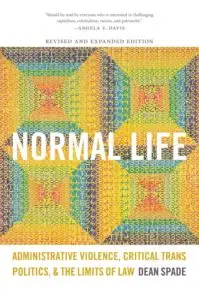We are excited to introduce our Bookworm Series, a new corner of the Plume blog where we dive into stories, ideas, and experiences written by and about trans people. This series is all about celebrating the voices that reflect our lives, our journeys, and the richness of trans experiences. These works, whether memoirs, poetry collections, or critical theories, offer a view of the world through the eyes of trans, non-binary, and gender non-conforming authors.
Each month, we’ll spotlight a new book or piece of writing, sharing the text’s key concepts and why it resonates with us. Our Bookworm Series is for everyone—avid readers and those new to trans literature. It’s a space to explore, reflect, and maybe find your next favorite read. Let’s celebrate the power of words and the importance of seeing ourselves on the page!
This month, we highlight Normal Life: Administrative Violence, Critical Trans Politics, and the Limits of Law by Dean Spade.
In Normal Life: Administrative Violence, Critical Trans Politics, and the Limits of Law, Dean Spade challenges views on trans justice. He questions the belief that changing laws alone can improve transgender people’s lives. Spade argues that while legal reforms can help, they often don’t address the root causes of harm for the most marginalized in the trans community.
Instead, he introduces critical trans politics, which urges us to rethink how the legal system, healthcare, and government can cause harm to trans people despite legal victories. These ideas push us to look closely at the various systems we live under and why true justice requires more than legal recognition. Let’s review the basic ideas that underpin Spade’s critique of mainstream legal and social systems:

Table of Contents
Administrative Violence
What It Means: Administrative violence is harm caused by government systems and bureaucratic processes. It often comes from policies and paperwork that hurt marginalized people. Unlike physical violence, this harm is subtle. It hides in systems we rely on daily, like healthcare, ID docs, and housing. For transgender people, the violence shows up as bureaucratic barriers. An example is the complex process of changing one’s name or gender marker on ID documents.
Why It Matters: Some legal victories, like the right to update gender markers, may seem like progress. But, they often fail to address the harm caused by administrative violence. For example, a trans person may face issues at the DMV, work, or medical offices even after they legally change their name. Navigating these systems is often costly, slow, and stressful. This is especially true for those marginalized by poverty, homelessness, or undocumented status.
Spade argues that, despite new laws, trans people still suffer. Oppressive systems inflict “administrative violence” on them. This is especially true for the most vulnerable, who may not have the resources to navigate these bureaucratic hurdles. Legal wins often help those already in a stable position but leave the most marginalized behind. This shows that focusing only on legal reforms is like putting a bandage on a deep wound, and more is required for the well-being of trans people.
Critical Trans Politics
What It Means: Critical trans politics seeks to challenge existing systems and shift the focus away from achieving equal rights within them. Instead of seeking a place in marriage, the military, or prisons, this approach asks why these systems exist and how to transform them. Spade argues that simply gaining access to harmful institutions won’t fix the deeper issues that trans people face. In fact, it may even reinforce these systems, making it harder to imagine a world without them.
Why It Matters: Spade encourages us to consider who benefits from certain legal reforms and who is left behind. Many celebrated the legalization of same-sex marriage. But, it didn’t help trans people who are homeless, face healthcare bias, or are incarcerated. We cannot resolve these deeper issues by including them in harmful systems. They require a radical rethinking of society’s structures.
Critical trans politics seeks to change systems. It prioritizes issues like trans homelessness and criminalization. It aims to help the most marginalized. It asks us to imagine better ways to organize society. They should be based on care and justice, not on harmful systems. Spade’s approach urges us to think beyond surface-level wins and strive for real, transformative change.
Neoliberalism
What It Means: Neoliberalism is an ideology. It prioritizes free markets and privatization. It values individual responsibility over the well-being of the group. In a neoliberal society, people are expected to find their way through social services, like healthcare and housing, on their own. The government provides little support. This philosophy blames individuals for systemic inequality. It makes it harder to challenge the structures that create these inequalities.
Why It Matters: Neoliberalism often expects trans people to pay for our healthcare out of pocket. Or, we must navigate complex systems designed to exclude us. For example, many trans people must cover the cost of hormone therapy or surgeries themselves. Many insurance companies either don’t cover them or make access feel impossible. Neoliberalism sees these challenges as personal, not societal. It leaves individuals to fend for themselves.
Spade argues that neoliberalism harms marginalized communities. It shifts the survival burden onto individuals and ignores systemic issues. It forces trans people to navigate hostile systems alone. This framework makes pushing for big changes, like universal healthcare or affordable housing, harder. It focuses on individual solutions, not on collective responsibility.
Equality and Inclusion
What It Means: The rights-based approach assumes that equal rights will fix issues for trans people. Equality and inclusion are often seen as the ultimate goals of social justice movements. For trans people, this has included serving in the military, marriage rights, or being recognized by the law. However, Spade critiques this focus. He argues that being included in oppressive systems doesn’t make them less harmful.
Why It Matters: Spade’s critique highlights the limitations of focusing solely on equality and inclusion. Allowing trans people to join the military might seem like a victory. But it doesn’t change that the military harms marginalized people worldwide. Trans people still face homelessness, healthcare discrimination, and job inequality.
Spade encourages us to focus on justice and liberation rather than simply asking to be included in systems that harm us. True justice requires creating alternative systems that prioritize care, community, and collective well-being. Trans justice requires addressing the deeper structural issues that impact people’s lives, such as healthcare discrimination, employment inequality, and incarceration. Instead of seeking a place in oppressive systems, we should work for a world where those systems are unnecessary.
Grassroots Movements Are Key to Change
Spade emphasizes the importance of grassroots movements in creating meaningful change. Grassroots networks, not legal reforms or politicians, provide immediate help. They offer mutual aid, free clinics, and housing assistance. These movements are a model for marginalized communities. They show how to organize to meet their needs and create lasting change.
Grassroots movements provide an alternative to the limits of the legal system. They focus on community care, solidarity, and collective action. They offer a way to directly address the needs of the most marginalized without waiting for legal recognition or approval.
Dean Spade’s Normal Life urges us to look beyond legal wins. We must consider the deeper, systemic issues that harm trans people. Spade introduces ideas like administrative violence, critical trans politics, and neoliberalism. They urge us to rethink our approach to trans justice. While legal reforms are essential, they are not enough to achieve true liberation. Instead, Spade calls for a radical approach. It should tear down oppressive systems and build alternatives based on care and our collective well-being as a community.



